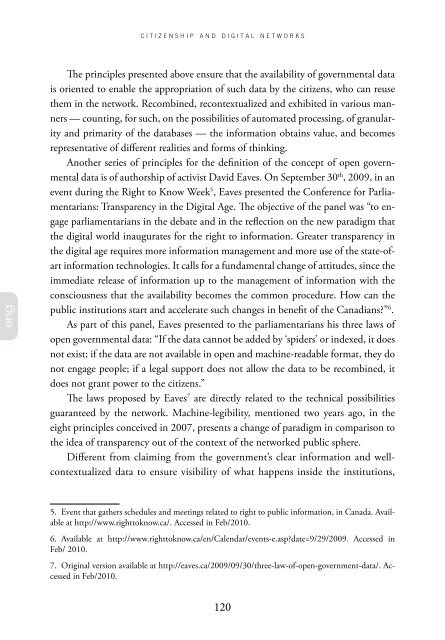Sergio Amadeu da Silveira - Cidadania e Redes Digitais
Sergio Amadeu da Silveira - Cidadania e Redes Digitais
Sergio Amadeu da Silveira - Cidadania e Redes Digitais
Create successful ePaper yourself
Turn your PDF publications into a flip-book with our unique Google optimized e-Paper software.
eng<br />
c i t i z e n s h i p a n d d i g i t a l n e t w o r k s<br />
The principles presented above ensure that the availability of governmental <strong>da</strong>ta<br />
is oriented to enable the appropriation of such <strong>da</strong>ta by the citizens, who can reuse<br />
them in the network. Recombined, recontextualized and exhibited in various manners<br />
— counting, for such, on the possibilities of automated processing, of granularity<br />
and primarity of the <strong>da</strong>tabases — the information obtains value, and becomes<br />
representative of different realities and forms of thinking.<br />
Another series of principles for the definition of the concept of open governmental<br />
<strong>da</strong>ta is of authorship of activist David Eaves. On September 30 th , 2009, in an<br />
event during the Right to Know Week 5 , Eaves presented the Conference for Parliamentarians:<br />
Transparency in the Digital Age. The objective of the panel was “to engage<br />
parliamentarians in the debate and in the reflection on the new paradigm that<br />
the digital world inaugurates for the right to information. Greater transparency in<br />
the digital age requires more information management and more use of the state-ofart<br />
information technologies. It calls for a fun<strong>da</strong>mental change of attitudes, since the<br />
immediate release of information up to the management of information with the<br />
consciousness that the availability becomes the common procedure. How can the<br />
public institutions start and accelerate such changes in benefit of the Canadians?” 6 .<br />
As part of this panel, Eaves presented to the parliamentarians his three laws of<br />
open governmental <strong>da</strong>ta: “If the <strong>da</strong>ta cannot be added by ‘spiders’ or indexed, it does<br />
not exist; if the <strong>da</strong>ta are not available in open and machine-rea<strong>da</strong>ble format, they do<br />
not engage people; if a legal support does not allow the <strong>da</strong>ta to be recombined, it<br />
does not grant power to the citizens.”<br />
The laws proposed by Eaves 7 are directly related to the technical possibilities<br />
guaranteed by the network. Machine-legibility, mentioned two years ago, in the<br />
eight principles conceived in 2007, presents a change of paradigm in comparison to<br />
the idea of transparency out of the context of the networked public sphere.<br />
Different from claiming from the government’s clear information and wellcontextualized<br />
<strong>da</strong>ta to ensure visibility of what happens inside the institutions,<br />
5. Event that gathers schedules and meetings related to right to public information, in Cana<strong>da</strong>. Available<br />
at http://www.righttoknow.ca/. Accessed in Feb/2010.<br />
6. Available at http://www.righttoknow.ca/en/Calen<strong>da</strong>r/events-e.asp?<strong>da</strong>te=9/29/2009. Accessed in<br />
Feb/ 2010.<br />
7. Original version available at http://eaves.ca/2009/09/30/three-law-of-open-government-<strong>da</strong>ta/. Accessed<br />
in Feb/2010.<br />
120


